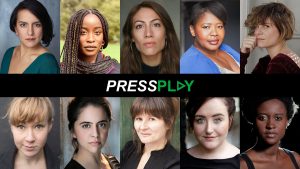Co-Founders of Popelei Tamsin Hurtado Clarke and Scarlett Plouviez talk about their online festival ‘Press Play’ showcasing a season of new digital performances

Within the past 7 months, the integration of digital within the arts has witnessed various creative responses to an otherwise challenging year. In response to current restrictions, award winning theatre company Popelei have curated a range of works for our new normal; shows programmed for their digital festival Press Play ‘set designed’ to help set the tone for each piece. Popelei co-founders Tamsin Hurtado Clarke and Scarlett Plouviez tell us more about the innovative festival and what to expect!
Hi Popelei, you’re the producer of Press Play, a season of new digital performances available to access until 2nd November. How is the season going so far?
Tamsin: The response has been overwhelmingly positive – we feel very lucky, thanks to our Arts Council Emergency Grant, to be able to offer all these digital pieces for free, so people up and down the UK have been able to log on and enjoy the work easily.
Scarlett: We are also lucky enough to be working with Emma Blackman Productions on producing this season – Emma is an absolute pro at shouting about new writing and experimental work, and she’s made sure everything runs smoothly.
The season is a response to the current pandemic, a platform showcasing new audio plays, a short film and a live Zoom performance. How did you approach programming the line up?
Scarlett: We came up with the basic concepts, and sent them to writers and creatives we’ve been keen to collaborate with and whose work explores similar themes to our own.
Tamsin: Yes, they were sort of creative provocations to artists… ‘Hey, what would you do if we asked you to write a play that had to be experienced by an audience member sitting on a park bench….GO!’. Everyone we asked was up for the challenge.
The shows chosen explore connection and empowerment. Did these themes originally form the basis of the festival or were these common ideas that stood out when choosing the line up?
Tamsin: I think these themes are best reflected in the way the pieces are consumed – the format of the shows explore new ways of connecting with audiences, as well as how an audience member can have an active and empowering role in how they experience digital theatre.
The audio plays – Mirrors, Feast, Half Acre and Food of the Gods – have specifically been ‘set designed’ to be experienced within a certain location (kitchen, mirror, park bench). Why factor in this particular aspect of experiencing the plays?
Scarlett: Partly I think it asks the listener to commit to the piece, to turn up and be physically and emotionally present, in a way that reminds us of what it feels like to turn up to a theatre or cinema. Also it gives room for the writers to be playful, to reach out to the listener and ask them to engage with their surroundings.
Both the short film and live performance taking part will feature international collaborations with UK and Latin American artists – with You Give Me Butterflies being performed in English and Desa(R)mar being performed via Zoom in Spanish. What have these international collaborations meant for establishing cultural connections?
Tamsin: This is an exciting thread of Popelei’s work, that we first tried out in our UK-Latinx arts festival Papaya Fest. We’re not sure exactly what it means yet to make work across continents, to collaborate across languages and cultures… but we’re excited to keep exploring, and to hear how artists and audiences experience this work. There’s something special about the effort and commitment that artists have to invest when they’re trying to work across distance, that seems to unlock a lot of energy and originality in the finished pieces.
Food of the Gods, a solo or two person audio experience sees you collaborating with the charity Womankind Bristol. What inspired Popelei to collaborate with the charity?
Scarlett: This idea came from our amazing producer Emma Blackman. Food of the Gods is a very special new piece written by the brilliant Bristol-based poet Tjawangwa Dema, and the play asks the listener to enjoy a delicious box of local chocolatier Zara’s Chocolates whilst listening. Because at this stage we are only able to offer these chocolate deliveries to a small and local audience, Emma thought it fitting to reserve these tickets for Womankind – so we can also celebrate the incredible work the charity have been doing to keep its members connected and supported during a particularly isolating year.
What can listeners expect from the season?
Tamsin: Each piece is a 10-20 minute break from the outside world, that transports you somewhere completely different. I think we could all do with that right now, when it can be easy to get stuck in the same old bad habits, particularly in how we interact with the overwhelming world of online media.
What would you like for audiences to take away from the season?
Scarlett: You mostly engage with the pieces on your own, but hopefully leave feeling like you have just spent time with the women in each story and shared an experience with listeners across the country.
Questions by Lucy Basaba.
Press Play is currently available to experience until Monday 2nd November 2020 online. To find out more about the digital festival, visit here…


Leave a Comment